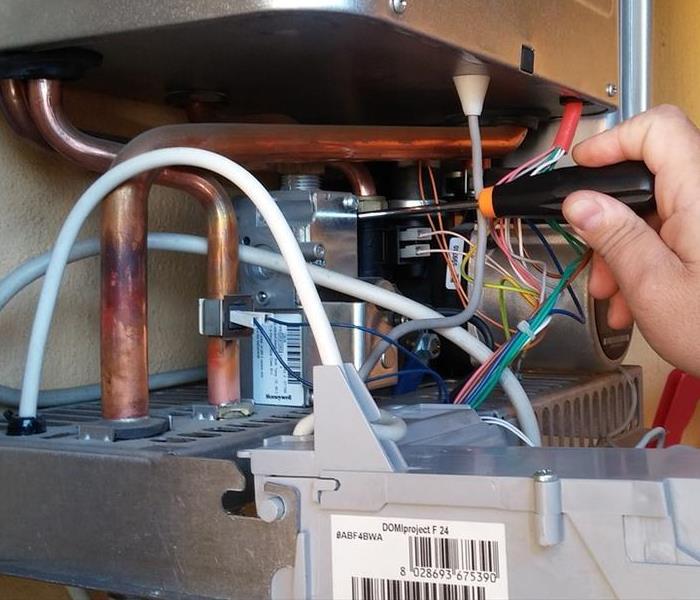Leaking Hot Water Heater?
1/31/2022 (Permalink)
Sooner or later everyone will experience a leaking hot water heater. But this minor emergency doesn’t have to become a major disaster.
Here’s a list of steps you can take to minimize the damage from a leaking heater:
Confirm that it is, in fact, your water heater that’s leaking.
Sometimes looks can be deceiving. If you see a puddle of water under your hot water heater, it’s obvious why your first thought would be a heater leak. But that may, in fact, not be the problem.
If it’s a small puddle, your first step should be to clean up the water and inspect the heater. Do you see any wet fittings or other signs of leakage from the tank itself? Check your surroundings for other water sources? Maybe there’s a nearby window or pipe that is the actual source of the water you see. Don’t forget about the effect of gravity! If your floor slopes, the water may have traveled from a different source point to the place where it ultimately pooled.
Turn off the water.
If you do have a leaking water heater, the next recommended step is to turn off the water.
Your hot water heater should have its own shut-off valve.
If your valve is broken, you may need to shut off the water to your home. If you need assistance, reach out to your local expert professionals.
Cut the power.
Whether you have a gas or electrically powered water heater, your next step is to shut off the fuel source that powers your heater.
A gas tank should have its own dedicated shut-off gas valve. You want to make sure the gas is off so your heater will be safe to work with. If you have an electric tank, you can shut off the power at the breaker.
Try to determine the location and cause of the leak.
Now that the water and power are off, you will be in a better position to assess your situation and try to determine the location and course of your leak:
Check the pipes that connect to your heater for any loose fittings. This may just require quick tightening with a wrench.
- Check your pressure relief valve. If the temperature or pressure is too high, this could be causing valve leaks. Your water heater should be around 120 degrees Fahrenheit and the pressure shouldn’t be over 80 PSI.
- Check the drain valve to make sure it doesn’t need replacing.
- Check the bottom of the water heater itself -- it may be that the tank itself is cracked and needs to be replaced.
If you determine that it is your tank that is leaking and the leak is serious, you may want to drain the tank to minimize further water damage.
Hopefully, the leak from your hot water heater hasn’t caused too much water damage. But if you need professional assistance, the restoration pros at SERVPRO of Jersey City North/The Heights are here to help. We’re equipped to handle any size water damage restoration needed for either residential or commercial buildings.




 24/7 Emergency Service
24/7 Emergency Service
